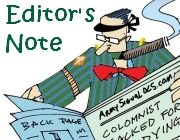

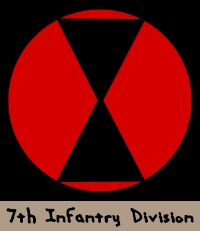
Signalmen are tough...
Editor’s Note: The stories that come from those who served in the Signal Corps in WWII are full of heroic ventures. In my family my Dad and two of my uncles served in WWII. Interestingly, all three of them were in the Signal Corps... well sort of, as you'll see below. However, just as interesting, I was a Signal Corps guy too, in my time, in Vietnam. Four people in one family in the Signal Corps... the Signal Corps runs deep and proud in my family's blood... we have given of ours for its goals.
My Dad served in a Coast Artillery unit in Hawaii, the 98th Coast Artillery Regiment, and was stationed at Schofield Barracks. However, he told me he was part of the Signal Corps, because while he wore the patch of his local Coast Artillery (AA) unit, his duties were related to communication... not the firing of the guns.
According to him, there was a grey line between the Signal Corps guys and the Artillery guys. As far as he was concerned, although his patch said he was AA, he was a Signalman, as that's where his daily orders came from. In typical early wartime fashion, he and many of those around him served two masters, as the concept of command and control was sorted out. Looking at it today, long after my Dad died, it makes sense... as back then the Signal Corps oversaw many, but not all, coast artillery installations... and in those cases where it did, it was usually because of the fact that Signals men ran the target spotting radar systems, such as the SCR-268.
Research regarding the development of lines of authority
and unit assignment indicates that
the situation in Hawaii was particularly complex.
As one source says, "separate HD and AA batteries were created, with troops hastily forwarded to the
island early in 1942, with all types of units being formed, disbanded,
re-designated, and transferred into and within what was considered the "war
zone," with dizzying rapidity. In addition, units were generally reassigned
without any mention in the records of why, where, or for what purpose...
worse... they were
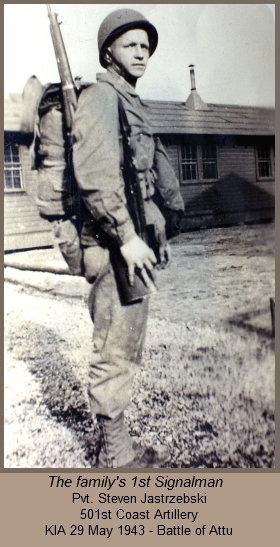 reassigned, minus personnel and equipment, with other units
being transferred between the Regular Army, Organized Reserves, and National
Guard... and to top it all off, inactive units were regularly moved between
organizations." Amongst all of this, it's nearly impossible to tell who among the
AA people were part of the Signal Corps, or vice versa, and/or part of some
other unit. Worse, when trying to track unit assignments, it is not easy to keep track of which units
really existed at
any given time, even though they were listed as being constituted. As many
historians will tell you, the whole mess in Hawaii as re. what units did what
and who they reported to reached a
crescendo during the first part of World War II, "at which time units appeared
and disappeared like props in a magician’s show."
reassigned, minus personnel and equipment, with other units
being transferred between the Regular Army, Organized Reserves, and National
Guard... and to top it all off, inactive units were regularly moved between
organizations." Amongst all of this, it's nearly impossible to tell who among the
AA people were part of the Signal Corps, or vice versa, and/or part of some
other unit. Worse, when trying to track unit assignments, it is not easy to keep track of which units
really existed at
any given time, even though they were listed as being constituted. As many
historians will tell you, the whole mess in Hawaii as re. what units did what
and who they reported to reached a
crescendo during the first part of World War II, "at which time units appeared
and disappeared like props in a magician’s show."
Not knowing what part of the magic show my Dad was in, I accept his statements, at face value: he was in the AA as well as the Signal Corps.
His youngest brother, Uncle Steve to me, while underage and foreign born (Poland), was so determined to fight for America that he lied about his age to get into the Army.
He was trained as a Signal radio-telephone man, as well as to lay cable... stop and think now... at Fort Eustis, VA. Yes, a Signalman at Ft. Eustis. After his training he was assigned to the 7th Infantry Division, under the famous Vinegar Joe Stillwell. Clearly, being trained in a place famous for artillery, but being counted as part of the signal guys, was unusual, just as it was in my Dad's case.
When he left Ft. Eustis he was assigned to the 501st Coast Artillery, at Ft. Ord, where along with the 7th Infantry Division, the 184th Infantry Regiment, the 78th Coast Artillery (AA) (less one battalion), and his unit, the 2d Battalion of the 501st Coast Artillery (AA), they trained in amphibious landings. After the most preliminary of training he and his unit were off again, assigned to the Pacific theater campaign. On 11 May 1943, they began to earn their stripes... they made a mostly unopposed amphibious assault on the beach of an island called Attu, in the Aleutians... then held by the Japanese.
At the time the U.S. thought that only about 500 Japanese were on the island. What they didn't know was that the Japanese strength had been increased to a total of approximately 2,400 men. The nucleus of combat troops included about one and a half battalions of infantry, three antiaircraft batteries armed with 75-mm. dual-purpose guns and lighter weapons, and two platoons of a mountain gun battery armed with 75-mm. pack howitzers. Clearly then, while there was only light action the first day, it was inevitable that the tables would soon turn.[1]
Eighteen days later Uncle Steve was dead.
Uncle Steve: Killed in action on the 29th of May, 1943, at the Battle of Attu, in a bayonet fight—a signalman staving off a rear echelon banzai night attack by the Japanese. And this after only 6 months in the Army.
Stabbed to death in hand to hand combat. Sometimes, in the Signal Corps, death comes up-close and personal.
Buddy letters to my Dad say they were awakened at about 3:45 a.m. by the cries of the Japanese, as they poured into the small compound of a dozen or so pup tents where the engineers and signal guys were sleeping. Hand-to-hand combat took place literally inside of and within a few feet at most of the tents that they stumbled out of. Many of the men never made it out of their tents, as the Japanese cut the tent ropes, collapsing the tent around those inside, and then bayoneted the writhing bodies struggling to get out of their sleeping bags and from under the fallen tent.
I've reread Uncle Steve's letters home and can tell you that he loved being an artillery–signalman and desperately wanted to go to Signal OCS. He applied several times, but was turned down; he was told that he didn't qualify because he was foreign born. Fight for America, yes. Become an Officer, no. Die for America, of course... at any time, thank you.
Even so, he understood... he said that he could well realize that it would be crazy for the U.S. to let foreigners become officers, especially Signal Officers, where they would then have access to all sorts of signals intelligence. Still, it hurt him... he wanted to be an American citizen badly; and an American Signal Corps Officer too.
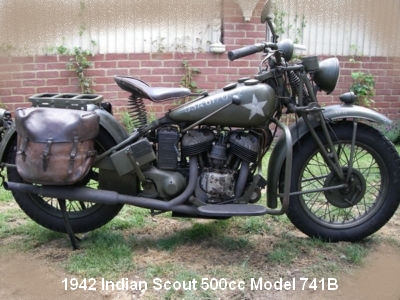 Well, some 20 odd years later I finished what he started. When I graduated as
part of Class 09-67 my mother pinned my bars on me, and while doing so whispered
to me, "This is for Uncle Steve."
Well, some 20 odd years later I finished what he started. When I graduated as
part of Class 09-67 my mother pinned my bars on me, and while doing so whispered
to me, "This is for Uncle Steve."
There's no need for tears though folks... as much as Uncle Steve wanted to be a Signal Corps Officer, he also wanted to be part of the 7th Infantry Division. He took immense pride in the unit, as it was mostly made up of a bunch of motley self service conscripts like himself, people who got swept up by the US Army's first ever peacetime military draft.
In spite of the fact that he enlisted, he identified with those he served with... conscripted soldiers. Little did he know though that the 7th would go on to such greatness. I like to think that Uncle Steve's death at the Battle of Attu was the first step in his unit's march to fame. He taught the 7th what real sacrifice was... and they learned the lesson well.
After he and the 548 other men who died with him on Attu gave their lives for the unit, the 7th went on to write its name in history... the Battle of Kwajalein, Battle of Eniwetok, Battle of Leyte, Battle of Yap Island, and the Battle for Okinawa, all during WWII... and then on to Korea for the Inchon Landings, Battle of Pork Chop Hill, and the Battle of Baldy. As Uncle Steve would have told you, the 7th was a hell of a unit. During the second World War alone, soldiers of the 7th Infantry Division won three Medals of Honor, 26 Distinguished Service Crosses, 1 Distinguished Service Medal, 982 Silver Star Medals, 33 Legion of Merit Medals, 50 Soldier's Medals, 3,853 Bronze Star Medals, and 178 Air Medals, as well as being credited with 4 campaign streamers and a Philippine Presidential Unit Citation. It also took the life of one of the best members of our family.
But the point of this story wasn't to tell you about Uncle Steve, it was to tell you about Signal Corps motormen. On my mother’s side, her older brother [and another of my favorite uncles], Corporal Hector Pepin, was a Signal Corps motorcycle motorman in Germany. Yup, another signalman in our family.
While running messages between units Uncle Hector came under enemy fire and was
thrown off of his
1942 Indian Scout 500cc Model 741B.
As he
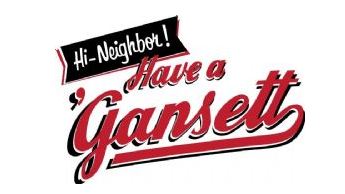 skidded to the ground the bike fell on him, and the hot engine and exhaust
manifold burned nearly completely through his stomach. Even so, he managed to
avoid the Krauts, crawl to safety, remount his bike, and still get
the message through... although he was scarred for life.
skidded to the ground the bike fell on him, and the hot engine and exhaust
manifold burned nearly completely through his stomach. Even so, he managed to
avoid the Krauts, crawl to safety, remount his bike, and still get
the message through... although he was scarred for life.
As for the heroics part of still getting the message through, after being wounded, he told me that it was really a practical choice more than heroism... it was shorter to the place he was going than it was to return to where he came from... so he dodged the enemy and motored on. As a pre-teen, I remember him showing me the toughened burn scars that covered the entire front side of his stomach and chest… I remember vividly sneaking looks at them, as he sat there, bare-chested, drinking Narragansett beer, and eating raw oysters at a family clam bake on our farm in New England.
Four Signalmen at one outing... one dead, one a mere child and not yet aware that he will become a signalman, and two old farts.
Signal Corps men are tough… even the enlisted ones.
Editor